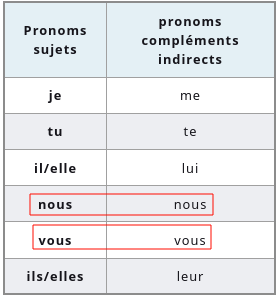English Translation
You are owed a thousand yen.
Shouldn’t it be Vous êtes dus mille yens?
You are owed a thousand yen.
Shouldn’t it be Vous êtes dus mille yens?
That’s an interesting construction (that wouldn’t be used in spoken French).
I see what you mean, but this sentence is actually fine as is.
You could think of it this way:
(To) you are owed mille yens.
Another (much more common) way to say it would be:
On vous doit mille yens.
That helps! But why “sont” and not “êtes”?
I hope someone will correct me if I’m off, but I think this is a dative-first construction: To you is owed a thousand yen.
I have been thinking about this sentence a bit more:

As you can see, one thing that does not help in this specific case is that in French “vous” is used both as a “sujet” and as a “complément” (object).
So maybe one way to make the difference between the English logic and the French logic clearer, is to use different pronouns:
I am owed 1000 yens (I = subject)
Me sont dus 1000 yens (Me = complément)
He/She is owed 1000 yens (He/She = subject)
Lui sont dus 1000 yens (Lui = complément)
They are owed 1000 yens ( They = subject)
Leur sont dus 1000 yens (Leur = complément)
You (regular you) are owed 1000 yens (You = subject)
Te sont dus 1000 yens (Te = complément)
In the example sentence:
I must admit I’ve let my French slip in later years, but this sentence feels like a rare exception to the regular word order. Do people say “M’a mordu un chien”, “M’est tombé une pomme sur la tête”, etc?
I wonder: would it be possible to say “Ils vous sont dus mille yens”?
Hi @morbrorper,
It is.
Not if they’re sober. ![]()
No, that wouldn’t work. You could say:
@paris2020
So… my original reply to your question is gone. I don’t know if it’s bug or user error and whether I can undelete it somehow.
Let me know if you understand why the French sentence is built the way it is.
Edit: Below is what I said in my original reply (in essence anyway).
Without even talking about this specific sentence :
That is not the case here.
I wonder if switching things around might make it clearer.
Consider this sentence :
The words are exactly the same, only the word order has been altered.
Can you see that “vous” is not the grammatical subject ?
The above French sentence could be literally translated as :
1000 yens [to you] are owed. OR
1000 yens are owed [to you].
The grammatical subject of the verb “are” is “1000 yens” – that’s the key point –
and thus “are” is translated as “sont” (3rd person plural) in the French sentence.
I then added the post you will hopefully find above, if it’s still there…![]()
I can comprehend the structure much better with “vous” being an indirect object and with your english translation “(To) you are owed mille yens.” “1000 yens vous sont dus.” makes it cristal clear. It will still trip me up each type, but I will keep this in mind and hopefully can access this exception when needed. Thank you!